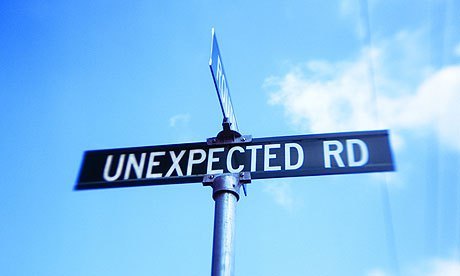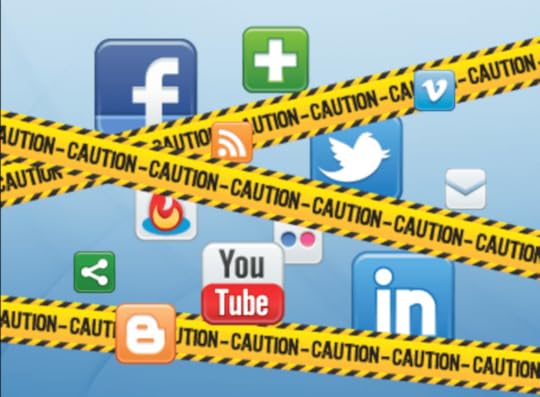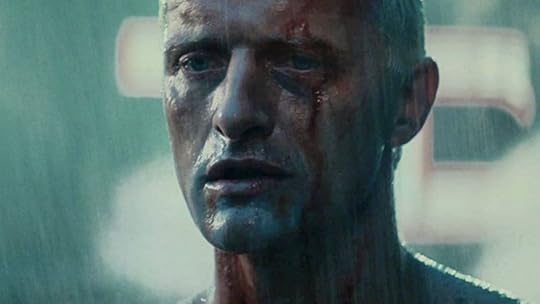Richard Harris's Blog, page 15
October 23, 2017
Quote of the Day
“I myself, as I’m writing, don’t know who did it. The readers and I are on the same ground. When I start to write a story, I don’t know the conclusion at all and I don’t know what’s going to happen next. If there is a murder case as the first thing, I don’t know who the killer is. I write the book because I would like to find out. If I know who the killer is, there’s no purpose to writing the story.”
― Haruki Murakami
Expect the unexpected. That’s today’s theme. Just when fit looks like it’s about to hit the shan – with everything nicely falling apart on the way – life has a Ha-Ha-Ha-funny way of swooping in and providing a much-needed set of paddles and life jacket (remember, ’cause you’re up a river and all).
Alternatively, just when things look all la-dee-da, peaches and freaking cream, rainbows sprouting out of frigging manholes, you get whacked over the head by a 2×4.
Boom! Eat it!
Even novelists, the grand puppeteers of the world, don’t understand how everything will unfold in their made-up universes of Plato-like, cave-dwelling prisoners. Theirs is to observe the flames on the wall, take their cues from human nature, and then pen the next sentence. Then a paragraph. And then a page and chapter and – if they’re lucky – a full-length story. If they’re really lucky, they’ll still be conscious and breathing when the last word is down on paper, all the answers (hopefully) answered somewhere along the way.
When the unexpected does – not if – happens, keep in mind something that the great Joseph Conrad once wrote: “Life has no meaning. Each of us has meaning and we bring it to life. It is a waste to be asking the question when you are the answer.”
— fin


October 22, 2017
iFear: Cell Phones & Social Media in a Brave New Era
Becky Mansfield over at Your Modern Family wrote a somewhat chilling piece on the extent to which cell phones and social media have altered a generation – in the not-so-good ways every parent fears – called “The scary truth about what’s hurting our kids.”
Reporting on empirical data presented through a number of mediums, notably Dr. Jean Twenge’s research and the findings she presented in her recent book, iGen:Why Today’s Super-Connected Kids Are Growing Up Less Rebellious, More Tolerant, Less Happy–and Completely Unprepared for Adulthood–and What That Means for the Rest of Us., Ms. Mansfield helps break down some alarming information in an easily digestible, if uncomfortable, way.
Without mincing words, Dr. Twenge has found that spikes began occurring in teen/tween angst, depression, anxiety, ADHD, sleeplessness and, in some cases, thoughts of suicide in 2012, the same year the first iPhone was released. Since then, the numbers are getting worse, not better. Here’s a summary per the above article of a few related stats:
1 in 5 children has mental health problems
43% increase in ADHD
37% increase in teen depression
200% increase in suicide rate in kids 10-14 years old
The article does offer coping strategies to parents, but if we as adults have a somewhat unhealthy relationship with all these new gadgets, one can only imagine how hard it is for younger people to navigate these waters without a considerable amount of difficulty. This is doubly true when it comes to bullying. Imagine having your least desirable enemies armed with the ability to follow you remotely to your bedroom through social media on a daily basis. Where does someone’s “safe place” become in an age when we are always connected?
As if anyone needs more proof of how serious this problem is, the article from the NYT I wrote about from October 11, 2017 (@simonwilliam: “Why Are More American Teenagers Than Ever Suffering From Severe Anxiety“) is still on the website’s most popular emailed stories – 11 days after it went up, a longevity I’ve not seen before on that site’s page.
Ultimately, the onus lies on us, as parents and adults and mentors and teachers, to lead by example. But that’s easier said than done. High-tech gizmos aren’t going anywhere, and the world is only becoming more interdependent. Suddenly those fears our grandparents had that our parents’ minds were being poisoned by the gyrations of Elvis Presley and the absolute lack of decorum that the Beatles displayed (with shaggy hair!)seem like such Leave It to Beaver-like problems now.


Writing/Publishing Jobs

Here are a couple of job opportunities, one for a correspondent in Seoul and the other for a three-month contract to proofread for the Toronto offices of HarperCollins.
For writers in Seoul:
United Press International is looking for a correspondent to be based in Seoul, South Korea, to cover breaking news; produce enterprise reporting on issues of global importance; and write features on culture and lifestyle topics.
For professional proofreaders:
HarperCollins is looking for a proofreader to ensure that all materials published by Harlequin are delivered to the printer or online retailer without spelling, grammar or typographical errors, meeting all editorial house style and typesetting standards.


October 21, 2017
Poetry Contest

Got a poem in you? Would you like $500 for your effort? Then click here and check out Realistic Poetry International’s poem contest. Note: entry fee is $4.00 per submission.


Quote of the Day
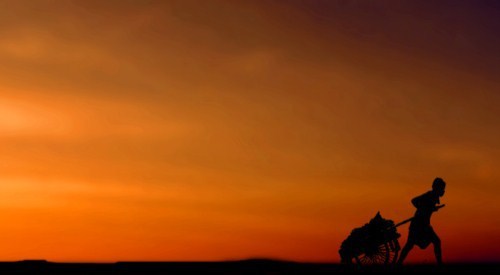
“No wonder we cannot appreciate the really central Kafka joke: that the horrific struggle to establish a human self results in a self whose humanity is inseparable from the horrific struggle. That our endless and impossible journey toward home is in fact our home.”
— David Foster Wallace, Consider the Lobster and Other Essays
David Foster Wallace is one of those towering figures of American literature whose legacy is as profound as his persona remains enigmatic, at least to many of us on the outside.
While he wrote both fiction and non-fiction – and with his non-fiction he wrote the gamut, from tennis and tornadoes to politics and pornography – today he is most widely remembered for his prose fiction, specifically Infinite Jest, which is seen by many as his magnum opus.
Set between an addicts’ halfway house and a tennis academy, Infinite Jest is a modern-day A Confederacy of Dunces, a reality where communists and pinkos and blockhead detectives are no longer the bad guys; it’s the entertainment industry as a whole, the shallow nature of television, and how “irony and ridicule are entertaining and effective, and that, at the same time, they are agents of a great despair and stasis in U.S. culture…”
A man of many interests and proclivities, Wallace has been described as someone who “wanted to progress beyond the irony and the metafiction associated with postmodernism.” Early in his career he was compared to writers such as Thomas Pynchon and John Irving, but the list expanded as the years passed – as did the many authors whose careers he would influence.
According to his father, Wallace suffered from depression for at least two decades. Sadly, another part of Wallace’s life would be compared to that of John Kennedy Toole at the very end, when David Foster Wallace took his own life in 2008. He was 46.


October 19, 2017
Gord Downie: Quote of the Day
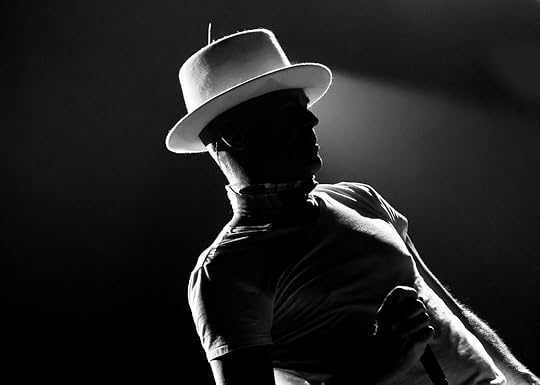
“Poetry is a voice that characterizes a nation. We should become a nation of poets rather than America-hater. It’s certainly more interesting.”
— Gord Downie, Canada’s rock-poet laureate
Canada is a nation in mourning. Tributes and farewells and love letters will continue to pour in, but we will never have him again. He has returned to that eternal and ethereal place among the stars where the brightest among us shine in perpetuity.
For reasons so many of us contemplated on nights filled with loud music, excessive drinking and cloud-filled rooms, the Hip never made it big in the States like Alanis Morissette, Rush, Shania Twain, Justin Bieber, Bryan Adams, Celine Dion, Avril Lavigne – the list goes on and on of Canadians who’ve made it mega-huge south of the border.
So why not The Tragically Hip? we asked on these now-fuzzy nights that memory has relegated to dark, hard-to-reach corners of our post-addled minds. How is there justice in this world if the Hip can’t be recognized for their talent and Gord Downie for his sheer brilliance?
That – not the current political climate – was all the proof we needed that something was awry not in Denmark, but across the 49th.
And then as we – and the Hip – grew older, we became more circumspect. We donned suits and ties, secured jobs and started families. We worried about mortgages and sicknesses. We quit smoking, drank less, and only smoked pot at get-togethers preceded by “10th” or “20th” or “25th.”
We didn’t listen to music as much. Hip album covers, which were once so reverentially removed from the CD cover and read between friends, thick as thieves with this musical treatise in our hands, were bygone items replaced by screenshots and digital pics. We’d visit a website from time to time, read a thing or two about someone, but it wasn’t the same because we were alone when we did this. It just wasn’t the same as it used to be.
Today, so poetic that Gord has faded with the last of our season’s dying embers, we prepare for the cold, biting winds and relentless chill to the early mornings/late nights, and what feels like – to us Canadians, at least – terminal darkness.
Or, as a contemporary of Gord Downie still sings so “full of grace”:
the winter here’s cold, and bitter
it’s chilled us to the bone
we haven’t seen the sun for weeks
too long too far from home
I feel just like I’m sinking
and I claw for solid ground
I’m pulled down by the undertow
I never thought I could feel so low
oh darkness I feel like letting go
But the darkness, of course, is not eternal. The light shines in the darkness and the darkness has not overcome it, and all. It will ebb and flow, and when we emerge on the other side, slightly worse for wear, we will still have him. That is our gift.
In short, Gord was right. We don’t need to be a nation of America-haters or begrudge their inability to venerate the Hip. We have them, all to ourselves, forevermore.
Writing for The New York Times yesterday, Simon Vozick-Levinson summed it up nicely in his article “Gord Downie, a Canadian Rock Legend, Sings Goodbye,” saying what can only be described as a Canadian-like eloquence and humility:
“The place of honor that Mr. Downie occupies in Canada’s national imagination has no parallel in the United States. Imagine Bruce Springsteen, Bob Dylan and Michael Stipe combined into one sensitive, oblique poet-philosopher, and you’re getting close.”
In the end, his poetry won out. That’s what we remember. That’s what we’ll take with us, as individuals and as a country, as we continue our journeys into the vast unknown, a place occupied by Wheat Kings and heavenly lyricists.
P.S. To read more of Gord Downie’s writing, check out Gord Downie Writing.


Quote of the Day

“Poetry is a voice that characterizes a nation. We should become a nation of poets rather than America-hater. It’s certainly more interesting.”
— Gord Downie, Canada’s rock-poet laureate
Canada is a nation in mourning. Tributes and farewells and love letters will continue to pour in, but we will never have him again. He has returned to that eternal and ethereal place among the stars where the brightest among us shine in perpetuity.
For reasons so many of us contemplated on nights filled with loud music, excessive drinking and cloud-filled rooms, the Hip never made it big in the States like Alanis Morissette, Rush, Shania Twain, Justin Bieber, Bryan Adams, Celine Dion, Avril Lavigne – the list goes on and on of Canadians who’ve made it mega-huge south of the border.
So why not The Tragically Hip? we asked on these now-fuzzy nights that memory has relegated to dark, hard-to-reach corners of our post-addled minds. How is there justice in this world if the Hip can’t be recognized for their talent and Gord Downie for his sheer brilliance?
That – not the current political climate – was all the proof we needed that something was awry not in Denmark, but across the 49th.
And then as we – and the Hip – grew older, we became more circumspect. We donned suits and ties, secured jobs and started families. We worried about mortgages and sicknesses. We quit smoking, drank less, and only smoked pot at get-togethers preceded by “10th” or “20th” or “25th.”
We didn’t listen to music as much. Hip album covers, which were once so reverentially removed from the CD cover and read between friends, thick as thieves with this musical treatise in our hands, were bygone items replaced by screenshots and digital pics. We’d visit a website from time to time, read a thing or two about someone, but it wasn’t the same because we were alone when we did this. It just wasn’t the same as it used to be.
Today, so poetic that Gord has faded with the last of our season’s dying embers, we prepare for the cold, biting winds and relentless chill to the early mornings/late nights, and what feels like – to us Canadians, at least – terminal darkness.
Or, as a contemporary of Gord Downie still sings so “full of grace”:
the winter here’s cold, and bitter
it’s chilled us to the bone
we haven’t seen the sun for weeks
too long too far from home
I feel just like I’m sinking
and I claw for solid ground
I’m pulled down by the undertow
I never thought I could feel so low
oh darkness I feel like letting go
But the darkness, of course, is not eternal. The light shines in the darkness and the darkness has not overcome it, and all. It will ebb and flow, and when we emerge on the other side, slightly worse for wear, we will still have him. That is our gift.
In short, Gord was right. We don’t need to be a nation of America-haters or begrudge their inability to venerate the Hip. We have them, all to ourselves, forevermore.
Writing for The New York Times yesterday, Simon Vozick-Levinson summed it up nicely in his article “Gord Downie, a Canadian Rock Legend, Sings Goodbye,” saying what can only be described as a Canadian-like eloquence and humility:
“The place of honor that Mr. Downie occupies in Canada’s national imagination has no parallel in the United States. Imagine Bruce Springsteen, Bob Dylan and Michael Stipe combined into one sensitive, oblique poet-philosopher, and you’re getting close.”
In the end, his poetry won out. That’s what we remember. That’s what we’ll take with us, as individuals and as a country, as we continue our journeys into the vast unknown, a place occupied by Wheat Kings and heavenly lyricists.
P.S. To read more of Gord Downie’s writing, check out Gord Downie Writing.


Ode to the Night, Ode to Gord
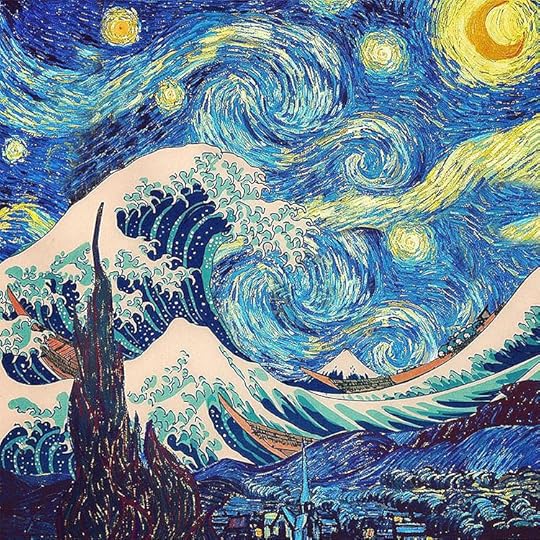
Insomniacs of the World, Good Night.
I can see the line of your brassiere.
I can contemplate it from here.
There’s no need for breathlessness
when we’re so far apart
I see us writhing in a phone booth
or laid back in the dewy grass of our youth
and gathering our sweetnesses
and wishing on the Neverstar.
And happy days of electrical smiles
and loving evenings falling down in piles
and not imagining a restlessness
that could keep us apart.
If I could sleep there’s a chance I could dream
and reconjure all of those vivid scenes.
O insomniacs of the world, good night.
No more wishing on the Neverstar.
— Gordon Downie (1964-2017)


October 18, 2017
Quote of the Day
“I’ve seen things you people wouldn’t believe. Attack ships on fire off the shoulder of Orion. I watched C-beams glitter in the dark near the Tannhäuser Gate. All those moments will be lost in time, like tears in rain. Time to die.”
Rutger Hauer (as Roy Batty), Blade Runner
In light of the fact that I finally saw Blade Runner 2049 last night, I have to use one of my all-time favourite quotes for the QOTD, which comes from the first Blade Runner (2019). As one professor has been quoted as saying, it is “perhaps the most moving death soliloquy in cinematic history.” Wow. Big words.
However, there’s a backstory to this (as there always is), and it has to do with the original scripted version (below) and the actor himself, Rutger Hauer. Not only were there changes made to the script before shooting, but Hauer is said to have improvised part of it in real-time. Wow again. If you don’t think they made the right decision to alter the words in this massive scene, check out the original:
“I have known adventures, seen places you people will never see, I’ve been Offworld and back…frontiers! I’ve stood on the back deck of a blinker bound for the Plutition Camps with sweat in my eyes watching the stars fight on the shoulder of Orion. I’ve felt wind in my hair, riding test boats off the black galaxies and seen an attack fleet burn like a match and disappear. I’ve seen it…felt it!”


October 17, 2017
It was a dark and stormy night…
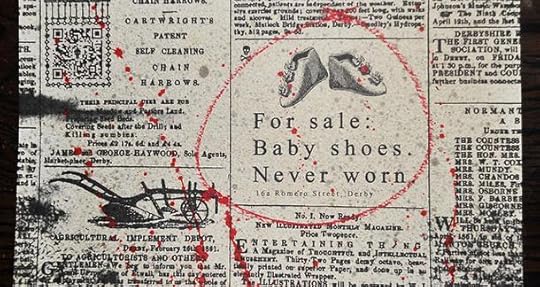
“For sale: baby shoes, never worn.”
You may be familiar with the above six-word story. Legend (stress the “legend”) has it that Hemingway bet some fellow colleagues that he could spin a “novel” (stress the use of this word as an adjective) in exactly six words – and off the top of his head, no less. We now know this as flash fiction, and while it’s suspect that this event ever took place, it’s still a powerful example of the maxim “less is more.”
You may also be familiar with the title of this post, what is considered by some pundits to be the worst opening to a book, what Writer’s Digest called the “literary posterchild for bad story starters.” Sorry, Mr. Bulwer-Lytton.
“It was a dark and stormy night; the rain fell in torrents — except at occasional intervals, when it was checked by a violent gust of wind which swept up the streets (for it is in London that our scene lies), rattling along the housetops, and fiercely agitating the scanty flame of the lamps that struggled against the darkness.”
Well, as it turns out, I received a challenge today. A literary challenge. From a Goodreads bot. Let me be clear about something: I don’t take no literary challenges from a freaking nameless, faceless piece of software.
The challenge? Write a horror story in two sentences. I did not shrink from this herculean task. I stood up to the bots of the world.
If you’d like to read my story on Goodreads, click here.



